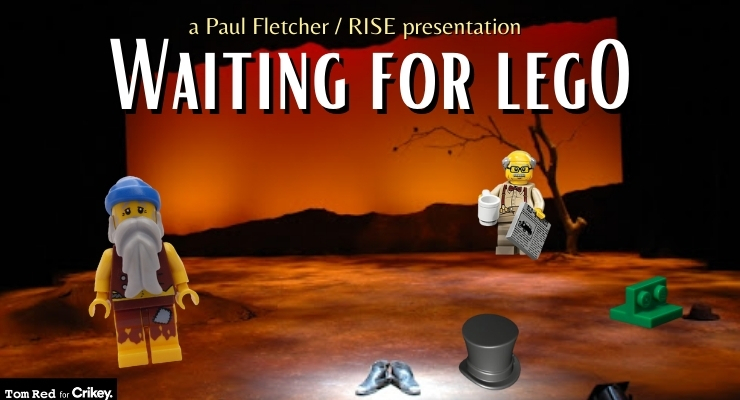
Is the government’s multimillion-dollar support package for the arts another rort in the making?
The Restart Investment to Sustain and Expand (RISE) fund was designed to help lift the troubled sector out of the pandemic. But critics say it has not only left huge parts of the arts community behind, but is also being exploited to fit the government’s political and ideological agenda.
Arts Minister Paul Fletcher has complete ministerial oversight over the $200 million fund (ministerial oversight is a key feature of the sports and commuter carpark rorts). Fletcher has final say over who receives funding, as opposed to the government’s Australia Council, which operates at arm’s-length from the government and has a peer review process.
A list of grant recipients released in September reveals a stark lack of diversity and a clear preference for popular, big-name entertainment events — a longstanding criticism of the scheme. Only one grant in the latest round went to an Indigenous organisation: $461,000 to the Gurindji Freedom Day Festival.
Although there are some less mainstream recipients in the mix, such as the Melbourne Fringe Festival which received $996,650, one of the biggest winners was a LEGO exhibition which got $733,000 on top of $688,000 in an earlier round.
Other big winners include $2 million for Sculpture by the Sea exhibitions at Bondi and Cottesloe, $948,479 for Round the Twist: the Musical, and $948,865 for a ballet version of An American In Paris. Cunnamulla’s Outback River Lights Festival — in Nats MP David Littleproud’s seat of Maranoa — got $225,000.
Crikey asked Fletcher for a breakdown of funding but he declined. He also would not comment on whether the scheme was open to rorting, given the minister had full discretion.
“The RISE fund has delivered $160 million to 387 projects, creating almost 170,000 job opportunities across Australia, for experiences which 46 million Australians will attend as the sector recovers,” his office said.
Jo Caust, an associate arts professor at the University of Melbourne, said the minister’s involvement meant the scheme was open to being manipulated: “They’re giving out large amounts of money to certain sectors and certain people, but some of the really core stuff isn’t getting anything.”
Caust, who has analysed earlier rounds of the scheme, says Indigenous-focused events received very little money and large commercial entertainment projects the government believed would bring the most jobs and the most audiences had been prioritised.
But she says there were also grants that raised serious questions about the selection process. One grant gave $620,000 to a Western Australian couple with no experience producing arts events, who promised to run weekly music events in a small town four hours from Perth.
Caust believes the fact there is no transparency about the selection process and that the minister has the final say over funding means it is ripe for rorting.
“These areas can be very vulnerable to rorting and political influence,” she said. “There’s no arm’s-length process involved … You can fund something in your marginal or Coalition seat. But that’s not how arts funding should be allocated.”
Midsumma Festival, one of Australia’s leading queer arts and cultural organisations, says it was disappointed to be knocked back from previous rounds of RISE funding.
“We didn’t apply in the last round but did apply the round before and were not successful, and were very disappointed by this as we felt it was a very compelling application and of course we have a strong background with what we do and have been heavily impacted upon by COVID-19 financially,” chief executive Karen Bryant said.
In March the federal government tripled the size of its coronavirus rescue package for the arts and entertainment industry, topping up the fund to $200 million instead of adding more money to the Australia Council’s budget.
The Australian National Audit Office and transparency organisations have singled out ministerial discretion as a key issue when it comes to the misuse of taxpayer funding.
Labor’s arts spokesman Tony Burke says the latest round of RISE funding showed why arts grants should be done principally through the Australia Council and not the minister.
“It doesn’t stop grants from being controversial,” he said. “But at least it means the discussion is about relative artistic merit, rather than whether a decision has been driven by politics or prejudice.”
Should the minister of the day have full discretion over how the funds are distributed? Let us know your thoughts by writing to letters@crikey.com.au. Please include your full name if you would like to be considered for publication in Crikey’s Your Say column. We reserve the right to edit for length and clarity.








apologies for bad spelling!
Sounds conservative and authoritarian on all fronts. Lego – hmm. It’s in woollies at the moment. So I think Australian gvt may be focusing on the good old building blocks of life. Surely woollies and the gvt have some sort of social tuning fork consortium happening.
The weakness of the RISE fund is that it awards money to events, but they haven’t happened. All the state lockdown and capacity reguations means that almost all of the money awarded has not been spent; so it’s actually dome nothing except earn interest in big promoter bank accounts. Live music is the poor cousin locked under the stairs. Live music acocunts for 55% of all enetrtainment revenues yet it has been awarded only $40m of the $200m fund; of that $40m, only $4m has been spent. The live music business is falling off a cliff it cannot survive.